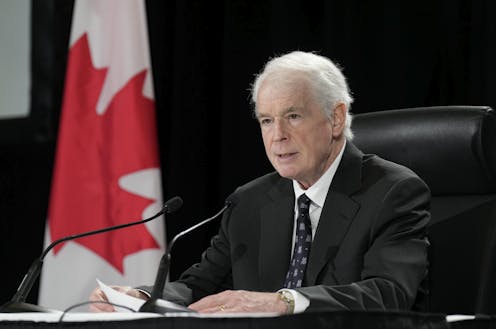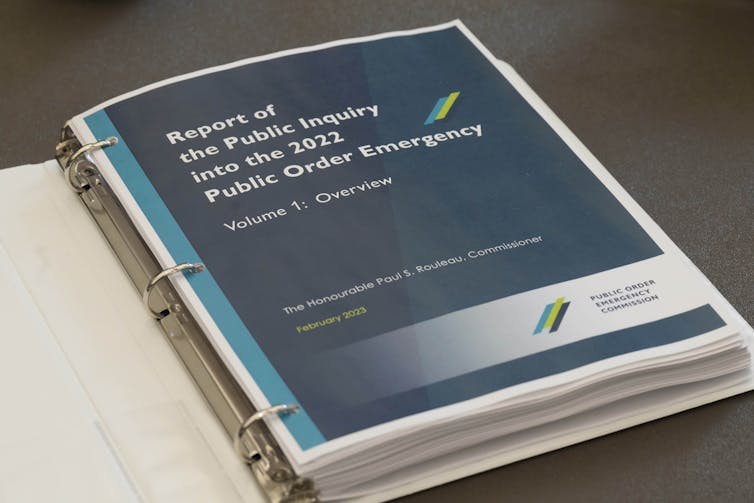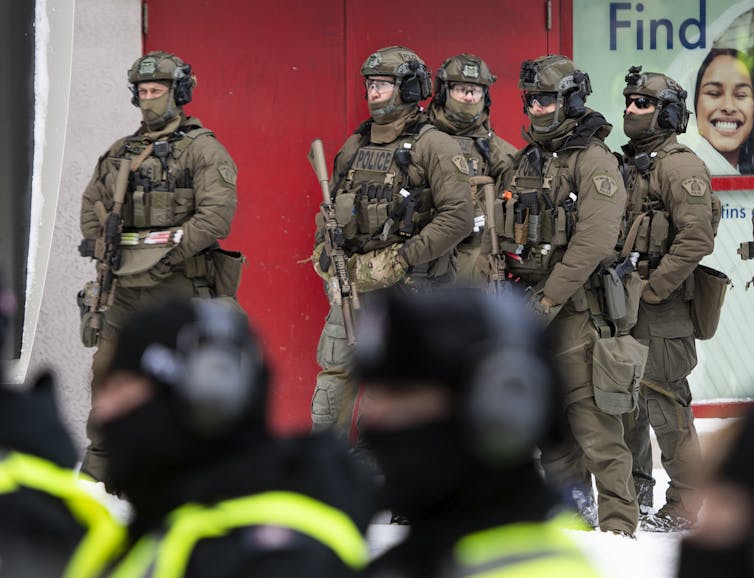
On Feb. 17, Justice Paul Rouleau issued his final report for the Public Order Emergency Commission. In a calm and measured tone, Rouleau concluded that the federal government’s use of the Emergencies Act to address the February 2022 Convoy Crisis was appropriate.
The Commission’s legally mandated role was to determine if the federal government’s use of the Emergencies Act was justified by gathering facts and laying them out before the public. In the overall framework of the act, such commissions promote the rule of law by facilitating public accountability.
It ensures accountability for the government’s use of emergency powers. While every constitutional regime has emergency laws that temporarily give the state concentrated power and the ability to limit rights in a crisis, most emergency laws prioritize flexibility over accountability. Canada’s Emergencies Act does not.
It’s far from perfect, but through mechanisms like the inquiry, the Emergencies Act takes the rule of law and accountability seriously.
At the front end of decision-making, the act sets out a labyrinth of unusually strict criteria for declaring emergencies and issuing emergency measures. These decisions are subject to parliamentary oversight.
At the back end of the process stands the requirement for an inquiry: any use of executive power must stand and justify itself before the public. In a democracy, the people are sovereign, and elections ensure we have the final say — even on emergency measures.
Rouleau’s report
In his five-volume report, Rouleau documents the convoy’s evolution. While its roots lie deeper, this movement galvanized around resistance to federal pandemic measures, then culminated in border blockades and the effective occupation of the national capital.

Reluctantly, Rouleau gave his qualified approval to the government’s decision to use the Emergencies Act to end the crisis. More cautiously, he approved only certain elements of the special temporary measures — restrictions on movement and property rights — the government undertook under the act’s authority to safely end the crisis.
But beneath Rouleau’s unruffled tone roils a current of chastisement, complicating headlines vindicating the federal government. The rule of law in an emergency is everybody’s job and Rouleau found that, in February 2022, nearly everyone fell short.
Many failures
Some convoy protesters, the report finds, concealed unlawful intentions under the guise of lawful protest. Those peacefully protesting vaccine mandates exercised freedoms vital to a healthy democracy. But among them were others who sought to overthrow the government.
Some protesters in Ottawa were considerate of their host city. Others mocked its residents’ misery. Some brought flags, but others brought guns. Those who cloaked their misdeeds under the guise of the public good fell short of respecting the rule of law.
But the report found that government leaders and news media who painted all the protesters as “a small fringe minority” fell short as well. These leaders disdained the fundamental rights at stake in the convoy events.
Convoy leaders fell short, too. The convoy evolved past peaceful, lawful protest. Organizers who wilfully ignored the harassment, threats and dangers the protest imposed on Ottawans must take responsibility for allowing the abuse of the fundamental freedoms they sought to celebrate.
Ottawa police fell short of fulfilling their duty. Their response, Rouleau found, was riddled with failures of planning, communication, co-ordination, intelligence-sharing, staffing and oversight. This was even the case when accounting for the unique difficulties of the crisis.

Weaknesses and gaps in federal intelligence gathering hampered the federal government’s ability to understand the convoy situation on the ground, to properly prepare and lend support to other governments and agencies.
Ontario’s government did little and collaborated less, leaving Ottawa residents feeling “abandoned by their provincial government during a time of crisis.” Rouleau confirmed: this was a failure of federalism. Government leaders had, on the whole, failed to put the common good above the politics of the moment.
A shared responsibility
Rouleau made dozens of recommendations about co-ordination and information-sharing within and between governments, oversight for secret and sensitive information and future commissions of inquiry. These sound dry, but the report shows it was at these very intersections where the rubber hit the road, so to speak.
Conflicts between values of co-ordination and autonomy, and transparency and secrecy, mean few of the proposed reforms will be easy. Some parties, such as Ontario Premier Doug Ford who previously disavowed the Commission, may have little motivation to come to the table at all. And in some ways, the report is a litany of failures; the fact that the Emergencies Act was necessary at all is nothing to celebrate.
But there is reason for cheer. The existence of the inquiry, and the presentation of the inquiry’s facts before the public, makes vibrant public discussion, accountability and demands for improvement possible. Such exercises of public accountability sustain the rule of law, even in times of crisis.
Now it’s our turn to take responsibility: how will we use these findings? What will we demand of leaders? How will we hold them to account at the polls? This is how we show our commitment to the rule of law project, a project for which we are all — every one — responsible.
Jocelyn Stacey receives funding from the Social Sciences and Humanities Research Council and the McLachlin Foundation. She was a member of the Public Order Emergency Commission's Research Council, but writes here as an expert and scholar in the field of emergencies and the law.
Nomi Claire Lazar receives funding from the Social Sciences and Humanities Research Council of Canada and the British Academy. She was a member of the Public Order Emergency Commission's Research Council, but writes here in her own capacity as a scholar of emergency powers.
This article was originally published on The Conversation. Read the original article.







